He wrote that "with the name "Giuittu", the Arabs indicated the black bitumen. They could have observed signs of hydrocarbon and that could have given the name of Gioitto to this zone?". Already in the 1929, as a solitary researcher, tried to define the oil peculiarity of Sicily ("petroliferità"): by sending his analysis and the first samples "of certain oil origin" taken by him, to the Sicilian territory to the Experimental Station for the Fuels Of Milan. As a political man, he tried, in every way, to bring to Bronte some economic benefits, deriving from the utilization of the hydrocarbons found on his territory. Despite his studies and the persistent action in searching for the petroleum, remained however, "a prophet in his country", unheeded, having had vulgar interlocutors, not only locally. Today the research, the utilization of oil fields, in Bronte and other zones of the island, and the use of methane have became Sicilian realities. In the territory were discovered important methane fields (gasoline), rich of liquid products degasified in a big plant, built, by the E.N.I., at a few kilometers from Bronte. "The petroleum meant a pacific revolution; the industrial and economic revolution which would have changed the face of my land; it meant a better future.
It meant the revival: it was worth to dedicate my modest efforts of technician to the first professional experience, the first love. And it was, truly a persistent action, searching for petroleum on my own, a composite action that I judged civil and social, among technique, journalism and politics". (Mario Lupo)
He indicated solutions, always looking at the development of our country
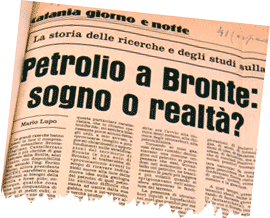 «We are rich in land, water, raw materials, energy of arms and intellects; but we live like rags." Hydrocarbons, energy sources, water, agriculture, industrialization, tourism, ecology, culture and development, regional autonomy, were the main themes of Mario Lupo's interventions published in the press. «We are rich in land, water, raw materials, energy of arms and intellects; but we live like rags." Hydrocarbons, energy sources, water, agriculture, industrialization, tourism, ecology, culture and development, regional autonomy, were the main themes of Mario Lupo's interventions published in the press.
In his writings as in his actions, aspects of his personality, political and social commitment, secularism, correct attitude that never bordered on controversy and, above all, great moral integrity and great humanity were always present. «Taken by ideal tensions - he wrote in the Espresso Sera of 27 January 1983 -, also working on youthful fantasies (or daydreams), in the Valley where the Simeto begins its course, I imagined steel towers (derriks) that drilled and pumps that they extracted oil and methane; I imagined a “flame” on a refinery tower, and a power station, and chemical factories: I imagined unemployment eliminated, and a new era of well-being for Bronte and the surrounding area; the sun of rebirth rising from the west, I was saying."  This is how the professor remembered it. Gaetano Longhitano in the commemoration made in the City Council on 24 March 1986 a few days after his death: This is how the professor remembered it. Gaetano Longhitano in the commemoration made in the City Council on 24 March 1986 a few days after his death:
«We have carefully reread his books as well as the more than one hundred articles he published in various magazines and newspapers, both local and national, and, from 1929 to a few days before his death, and we have never found a shadow of controversy but constructive criticism always aimed at raising problems and indicating solutions, always looking at the development of our country.
Of course, a sense of bitterness often transpires in his writings which never becomes despondency and pessimism, because he always had the strength to look ahead: "and then it will be day", he wrote in one of his 1966 articles. Bitterness at the climate of incomprehension that surrounded him, especially among men in power, and very often among those men of culture to whom he addressed himself in a particular way, aware of the important role that the intellectual has in the processes of transformation of society. Having failed all attempts to channel Bronte along the path of development, he feels the need to stop for a moment and reflect on why a country rich in resources continues to live in poverty." «We are rich - he told me, shortly before his death, one day when I went to visit him at home - we are rich in land, water, raw materials, energy of arms and intellects; but we live like rags."
|
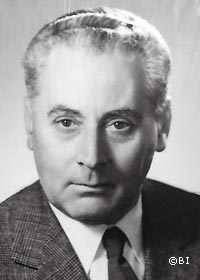 Mario Lupo was born in Bronte in 1904 into an artisan family. After attending the local gymnasium and classical high school in Adrano he graduated in Pure Chemistry at the University of Bologna in 1928, having had as teachers, among others, professors Levi and Padovani.
Mario Lupo was born in Bronte in 1904 into an artisan family. After attending the local gymnasium and classical high school in Adrano he graduated in Pure Chemistry at the University of Bologna in 1928, having had as teachers, among others, professors Levi and Padovani. «We are rich in land, water, raw materials, energy of arms and intellects; but we live like rags." Hydrocarbons, energy sources, water, agriculture, industrialization, tourism, ecology, culture and development, regional autonomy, were the main themes of Mario Lupo's interventions published in the press.
«We are rich in land, water, raw materials, energy of arms and intellects; but we live like rags." Hydrocarbons, energy sources, water, agriculture, industrialization, tourism, ecology, culture and development, regional autonomy, were the main themes of Mario Lupo's interventions published in the press. This is how the professor remembered it. Gaetano Longhitano in the commemoration made in the City Council on 24 March 1986 a few days after his death:
This is how the professor remembered it. Gaetano Longhitano in the commemoration made in the City Council on 24 March 1986 a few days after his death: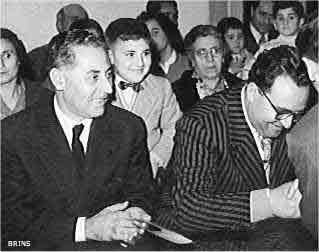
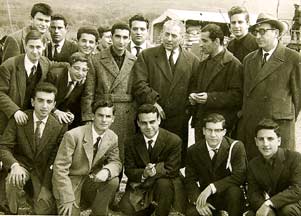
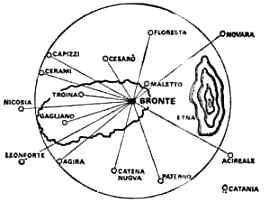
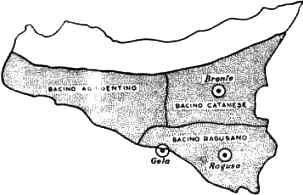
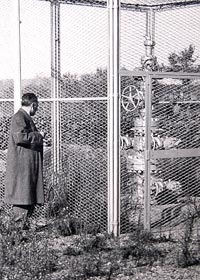 1956: The prof. Mario Lupo next to an active well of methane extraction near Bronte. «When sowing the important thing is that someone picks up. If we do not celebrate the dreamed reality, it will be our children or grandchildren»"(Mario Lupo).
1956: The prof. Mario Lupo next to an active well of methane extraction near Bronte. «When sowing the important thing is that someone picks up. If we do not celebrate the dreamed reality, it will be our children or grandchildren»"(Mario Lupo). To reach and see his dreams realized by prof. Mario Lupo lavished his energies in a thousand ways: books, articles on the columns of newspapers and magazines, letters, petitions, proposals, organization of associations and conferences, interventions in public debates, solicitations to politicians of the most varied extraction.
To reach and see his dreams realized by prof. Mario Lupo lavished his energies in a thousand ways: books, articles on the columns of newspapers and magazines, letters, petitions, proposals, organization of associations and conferences, interventions in public debates, solicitations to politicians of the most varied extraction.
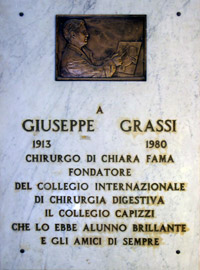 substantially the result of a great interest in digestive pathology, a field that kept him engaged in a diligent search for in-depth study and improvement of some operating techniques, particularly those for the therapy of peptic ulcer, which he predicted in terms of conservative treatment, the same that will later find its definitive validation with antisecretory and antimicrobial drugs."
substantially the result of a great interest in digestive pathology, a field that kept him engaged in a diligent search for in-depth study and improvement of some operating techniques, particularly those for the therapy of peptic ulcer, which he predicted in terms of conservative treatment, the same that will later find its definitive validation with antisecretory and antimicrobial drugs."